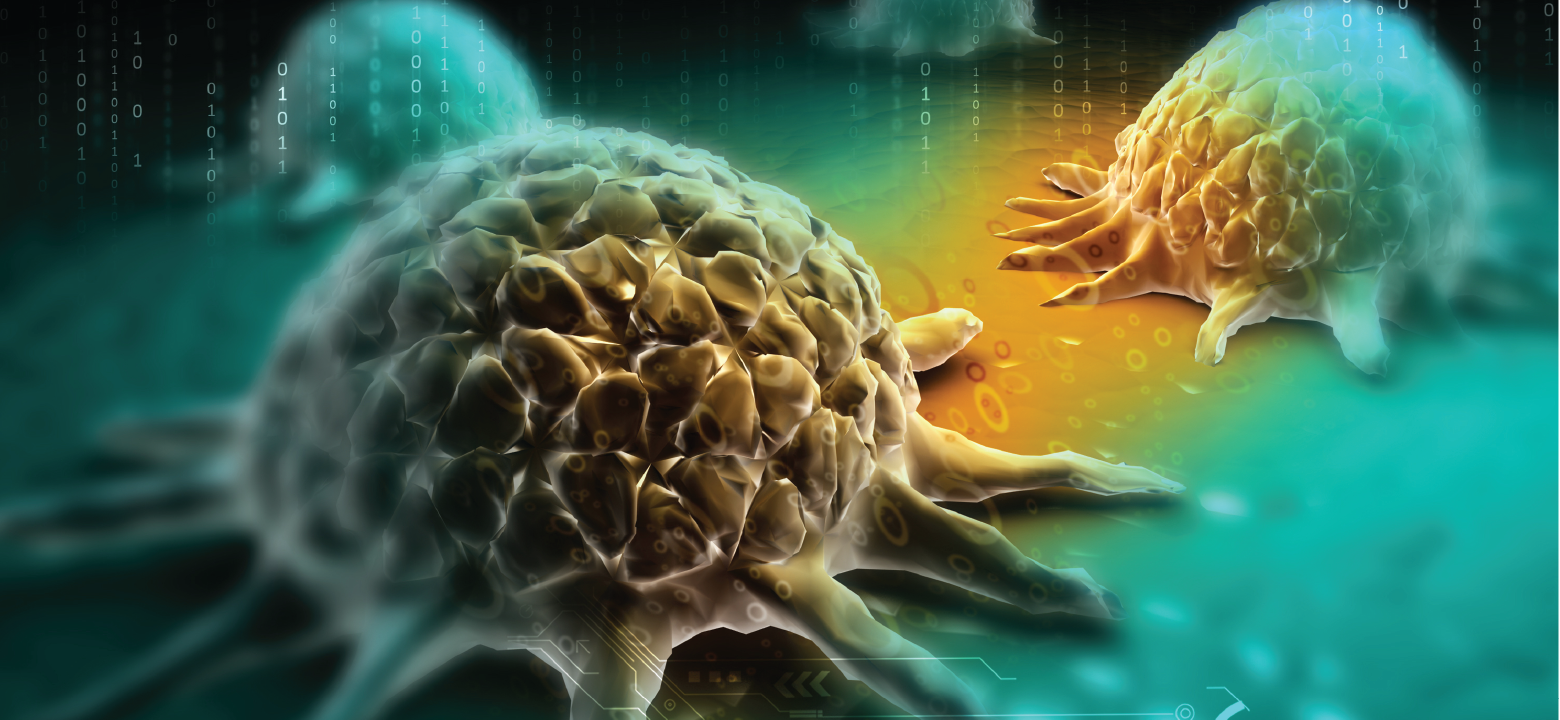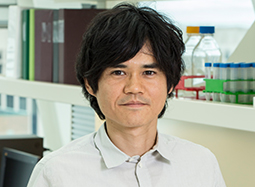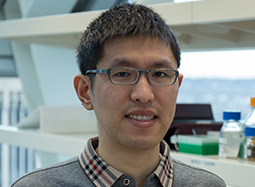Van Andel Research Institute scientists help redefine how cancer is categorized
Comprehensive scientific resource highlighted in more than two dozen papers published in Cell Press by The Cancer Genome Atlas
April 5, 2018

GRAND RAPIDS, Mich. (April 5, 2018) — Van Andel Research Institute (VARI) announced today that the work of its scientists is featured in 27 papers focused on the output of The Cancer Genome Atlas (TCGA). The papers were published across the Cell Press family of journals.

The findings are the result of a global scientific collaboration and mark the culmination of TCGA, a multi-institutional, joint effort between the National Cancer Institute (NCI) and the National Human Genome Research Institute (NHGRI) to develop a comprehensive scientific resource for better categorizing cancer. The more than decade-long initiative is the most in-depth undertaking of its kind, spanning 10,000 tumors across 33 cancer types.
“TCGA’s findings have greatly deepened our molecular understanding of the major cancer types,” said Peter W. Laird, Ph.D., a professor at VARI who led the DNA methylation analysis for TCGA Research Network and who is senior author on two of today’s papers. “It is our hope that these publications will serve as a guide for scientists who plan to harness TCGA’s robust data to develop new, more personalized methods of patient care.”
This research, which represents the project’s capstone, joins dozens of other papers that have been published since TCGA’s inception in 2005. Collectively, they provide a highly detailed description of molecular changes occurring in all major human cancers. The use of this molecular atlas is rapidly expanding, with more than 1,000 publications citing TCGA data in 2017 alone.
The current series of TCGA papers is organized into three thematic categories — cell-of-origin, molecular pathways and oncogenic processes. The findings from each category are summarized in overview papers published in Cell, with specifics outlined in supporting studies published in Cell, Cancer Cell and Cell Reports, among others. All of the findings are available through a central hub at http://www.cell.com/pb-assets/consortium/pancanceratlas/pancan/index.html.
TCGA data may be accessed through the National Cancer Institute’s Genomic Data Commons Data Portal (portal.gdc.cancer.gov).

Along with Laird, VARI Assistant Professor Hui Shen, Ph.D., contributed to many of today’s papers, summaries of which may be found below. Shen also is one of six experts who authored retrospectives on TCGA’s legacy, which also were published in Cell.
Cell-of-origin patterns molecular classification of 10,000 tumors from 33 types of cancer. Cell.
Investigators identified 28 cancer subtypes with molecular characteristics that are strongly influenced by the type of cell in which they arise. Some of these subtypes correspond to specific organs of origin, while others appear to reflect shared molecular characteristics that span the traditional anatomic boundaries originally used to define the 33 tumor types included in the analysis.
The new classifications utilize a combination of genomic, epigenomic, transcriptomic and proteomic measurements, and emphasize the importance of moving to a more targeted molecular approach for categorizing disease type.
While the findings could affect treatment of all cancers, they are particularly significant for the small number of cases where the cancer’s origin is unclear. Because each type has varying levels of aggression and susceptibility to certain therapies, employing more precise diagnostic methods can have a major impact on patient prognosis and wellbeing.
“Classifying cancers based on their genetic and epigenetic profiles can help simplify complicated treatment decisions and may spare patients the burden of undergoing treatments with unwanted side effects but no likely benefit,” said Laird, who led the cell-of-origin team and is senior author on the overview paper. “It also will help physicians better stratify patients into clinical trials, thereby enabling patients with specific mutations to receive access to targeted therapies.”
Co-first authors of the paper are Katherine A. Hoadley, Ph.D., of Lineberger Comprehensive Cancer Center at University of North Carolina; Christina Yau, Ph.D., of the Buck Institute for Research on Aging and University of California, San Francisco; and Toshinori Hinoue, Ph.D., a bioinformatics scientist in Laird’s lab at VARI.
Comparative molecular analysis of gastrointestinal adenocarcinomas. Cancer Cell.
Gastrointestinal cancers can be divided into at least five main subtypes based on molecular criteria, a change that bucks traditional anatomic and histologic classification methods and could lead to more precise treatment, report the authors of today’s pan-gastrointestinal paper.

“We identified previously unrecognized nuances in the molecular features of gastrointestinal adenocarcinomas with either hypermutation or chromosomal instability,” said Toshinori Hinoue, Ph.D., a bioinformatics scientist in Laird’s lab and co-first author on the paper. “In all, the genetic and epigenetic alterations we found act as fingerprints, which will aid physicians in better diagnosing and treating patients.”
Read our blog post, Comprehensive atlas redefines gastrointestinal cancers, by clicking here.
Laird is senior author on the paper, along with Adam J. Bass, M.D., of Harvard University and Dana-Farber Cancer Institute, and Vésteinn Thorsson, Ph.D., of the Institute for Systems Biology. Yang Liu, Ph.D., and Nilay S. Sethi, M.D., Ph.D., of the Broad Institute and Dana-Farber Cancer Institute; and Barbara G. Schneider, Ph.D., of Vanderbilt University Medical Center, are co-first authors along with Hinoue.
Machine learning identifies stemness features associated with oncogenic dedifferentiation. Cell.
Using a new set of criteria to better understand the degree to which cancer cells acquire or retain stem cell-like qualities, the authors uncovered novel molecular vulnerabilities that may be targets for new therapies.
VARI contributions: Laird

Genomic and molecular landscape of DNA damage repair deficiency across The Cancer Genome Atlas. Cell Reports.
The authors discovered that alterations to DNA damage repair pathways are common across many cancers, opening new avenues for drug development.
VARI contributions: Laird, Shen and Huihui Fan, Ph.D., a postdoctoral fellow in the Shen lab
A comprehensive pan-cancer molecular study of gynecological and breast cancers. Cancer Cell.
Investigators identified six molecular features that will allow clinical laboratories to more easily categorize gynecological and breast cancers into one of five newly identified prognostic molecular subtypes.
VARI contributions: Fan and Shen

Oncogenic signaling pathways in The Cancer Genome Atlas. Cell.
Analysis of more than 9,000 tumor samples resulted in a detailed description of alterations across the 10 most common molecular pathways that drive cancer (cell cycle, Hippo, Myc, Notch, b-catenin/WNT, PI-3-kinase/Akt, receptor-tyrosine kinase/RAS/MAP-kinase signaling, P53, TGFb and oxidative stress responses). In 49 percent of tumors, the team identified at least one potential drug target, and in 31 percent, they identified multiple possible therapeutic targets.
VARI contributions: Laird, Shen and Wanding Zhou, Ph.D., a postdoctoral fellow in the Laird and Shen labs
Genomic, pathway network, and immunologic features distinguishing squamous carcinomas. Cell Reports.
Analysis of squamous cancers from five sites — the lungs, the head/neck, the esophagus, the cervix and the bladder — have revealed genetic changes linked to tobacco consumption and human papillomavirus (HPV) infection, as well as other specific molecular signatures that differentiate disease subtypes.
VARI contributions: Fan (co-first author), Shen, Laird
Comprehensive molecular characterization of renal cell carcinoma. Cell Reports.
The authors analyzed three major histologic subtypes of renal cell carcinoma for similarities and differences in overall biomarker composition, which could impact therapeutic responses and prognoses, potentially enabling more precise treatment decisions.
VARI contributions: Laird, Shen and Fan
A full list of papers may be found at http://www.cell.com/pb-assets/consortium/pancanceratlas/pancan/index.html.
Symposium to be held
To celebrate TCGA’s achievements, Cell Symposia will host TCGA Legacy: Multi-Omic Studies in Cancer on Sept. 27–29, 2018 in Washington, D.C. The symposium will include a keynote address by Francis Collins, M.D., Ph.D., director of the National Institutes of Health, as well as talks from several TCGA authors including Laird and Shen.
The manuscripts highlighted in this release are part of The Cancer Genome Atlas (TCGA) Program, a joint effort of the National Cancer Institute (NCI) and the National Human Genome Research Institute (NHGRI).
Research reported in this publication was supported by the Intramural Research Program and the following grants from the National Institutes of Health: U24 CA143799, U24 CA143835, U24 CA143840, U24 CA143843, U24 CA143845, U24 CA143848, U24 CA143858, U24 CA143866, U24 CA143867, U24 CA143882, U24 CA143883, U24 CA144025, U54 HG003067, U54 HG003079, U54 HG003273 and P30 CA16672. The content is solely the responsibility of the authors and does not necessarily represent the official views of the National Institutes of Health.
###
ABOUT VAN ANDEL RESEARCH INSTITUTE
Van Andel Institute (VAI) is an independent nonprofit biomedical research and science education organization committed to improving the health and enhancing the lives of current and future generations. Established by Jay and Betty Van Andel in 1996 in Grand Rapids, Michigan, VAI has grown into a premier research and educational institution that supports the work of more than 360 scientists, educators and staff. Van Andel Research Institute (VARI), VAI’s research division, is dedicated to determining the epigenetic, genetic, molecular and cellular origins of cancer, Parkinson’s and other diseases and translating those findings into effective therapies. The Institute’s scientists work in onsite laboratories and participate in collaborative partnerships that span the globe. Learn more about Van Andel Research Institute by visiting vari.vai.org. 100% To Research, Discovery & Hope®.
Media Contact
Kayla Habermehl, 616.234.5157, [email protected]
ABOUT THE CANCER GENOME ATLAS
The Cancer Genome Atlas Research Network represents a collaborative effort of the National Cancer Institute (NCI), National Human Genome Research Institute (NHGRI), and more than 100 medical and research centers on six continents. The Atlas generated comprehensive, multi-dimensional maps of the key genomic changes in 33 types of cancer that pose immediate public health issues or are poorly understood.